VC Sehgal: ‘Our best strategy has been not to have a strategy.’
The Chairman of the Rs 66,000 crore Samvardhana Motherson Group, which is India’s leading Tier 1 supplier and a full systems solutions provider to the global automotive industry.
Find out why Vivek Chaand Sehgal, the chairman of the Rs 66,000 crore Samvardhana Motherson group is not worried about the impact of autonomous cars or vehicle electrification, Motherson Innovations as a game-changer in the future, and the need to handhold Tier 2 and 3 suppliers both in India and overseas markets.
Do you credit the diversification of the Motherson Group to your engineering strengths?
If you'll see, there is a whole lot of logic to the entire madness. We have always stayed on the core of technology but more so in those technological areas which allow one to have unimaginable creativity, for instance, design.
We opened our first centre in Australia, and today we have close to 30 design centres globally. To complement design, one has to have engineering which is what we have always focused upon. We have seven state-of-the-art tool rooms and plan to add more. While China can be a good source of tooling and we do procure from there, one should have the basic capability of having a good tool room in-house to deliver the high levels of accuracy, geometry, tolerances and surface finishes in the end products.
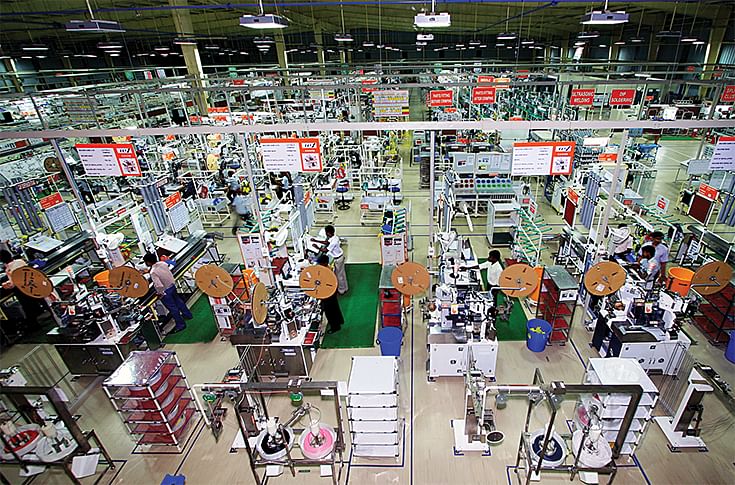
SMG's wiring harness plant in Gurgaon produces wiring harnesses for cabin, floor, instrument and doors for Maruti Suzuki models.
While we have seen the tool rooms and design centres coming in, we have always been strong in the assembly process. Our expertise in wiring harness assembly gave us the courage to not shy away from assembling cockpits, bumpers or even the front-ends of cars.
In 1997, we announced our company vision – to be a globally preferred solutions provider – which has helped us to come where we are today. All the product lines that we are into are solutions to the problems our customers had, and in that sense we keep growing. We have grown approximately 6,000-7,000 times since we went public, and that hasn’t happened because the car market has grown so significantly, it is just that we have kept on enhancing our ‘content per car’, which is at the behest of the customer who is asking us to solve a particular problem. With 80-85 percent of the car today being made by vendors like us, there are lots of opportunities and chances in the world.
What gives you the confidence as an Indian company to go out and make acquisitions, and does India have control over technological developments?
We are a global outfit and with our latest acquisition of France’s Reydel Automotive, we now have a presence in 41 countries. Being Indian gives us a huge back and with that, we feel fearless and are able to go anywhere in the world.
Yes, while we control the technology, all our different acquisitions and plants operating in different geographies have different capabilities and wherever the need be, we can move around and set up plants and do the know-how transfer.
Given current market dynamics, what is your growth outlook for India as well as for global industry?
In today’s environment, there are a lot of challenges with the fundamental one being that every country has to have some semblance of balance and payments. Automobiles can be a very heavy draw if you are not producing them. While developed countries like Australia can afford to not have domestic production, for the emerging or the under-developed economies it is quite a huge draw.
PKC of Finland is a leading name for supplying electrical distribution systems in the CV industry.
So, I think, there will be a demand for every single price-segment of cars globally, somewhere or the other. But, I also believe that more and more countries are going to move towards manufacturing or at least assembly, which is very good news for us.
As per my personal research, car production has never gone down in the last 60 years, even in times of tough crisis like the Lehman Brothers’ fallout, when the numbers were positive. So, globally, while there are going to be some ups and downs, from a five-year perspective, like we do at Motherson, these dips are just small aberrations in the larger picture.
Automotive cannot be followed quarter to quarter – it is all about the need for transportation, which could be in the form of last-mile connectivity or scooters and motorcycles, and hence, I cannot imagine a world without automobiles and the future looks very bright.
With developed markets like the US and the UK showing a declining trend, do you still see the scenario to be positive?
There are multiple reasons and cannot just be related to the political scenarios. There have been umpteen examples where the carmakers themselves have misread the market. But, from a consumer perspective, there still is fascination and demand for automobiles around
the world.
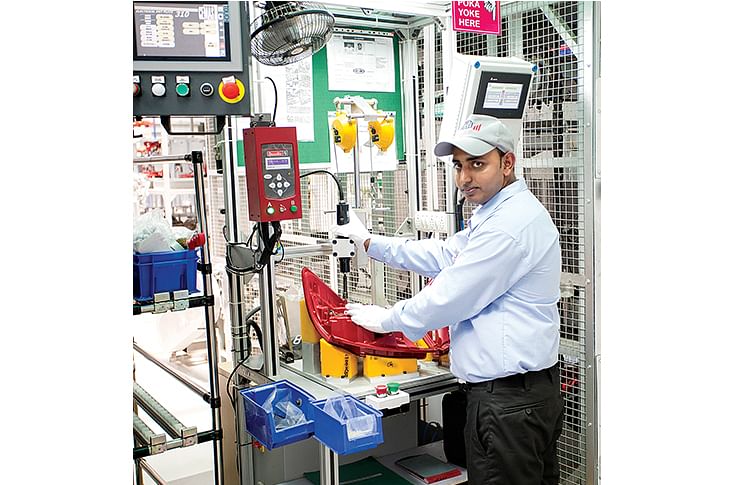
MMM, a JV between Motherson and Italy's Magneti Marelli, has an installed capacity of 1,200,000 tail-lamps and 900,000 air intake manifolds for PVs at its Bawal plant in Haryana.
We do not delve too much into why markets follow a particular demand trend. For instance, around the same time last year, there was a global slowdown and we went ahead and acquired PKC, which shot our revenues up by 10-12 percent. With Reydel this year, we are expecting a similar surge. So, momentary dips don’t matter that much to us.
Your current five-year plan (FY2015-2020) states the ‘3CX15’ principle. What’s the rationale behind it?
The 3CX15 philosophy infers to no customer, no component and no country contributing more than 15 percent to our overall turnover. We have to de-risk ourselves somewhere, and since we are a 100 percent OEM supplier, that allows us to think differently and not supply completely to just one customer. While we don’t say no to business, we are growing at such a high speed that obviously, whatever growth we have from one customer, it still keeps falling short of 15 percent.
So, that’s the whole idea – to keep growing and then, the customer share keeps squeezing. We are sure that our next five-year plan is going to focus on 3C10, but, if we are able to achieve our target of reaching US$ 18 billion for MSSL or US$ 26 billion for SMG, even 10 percent of that itself is going to be a huge number.
Motherson’s turnover at Rs 16,016 crore (+24%) and net profit of Rs 482 crore (+57%) in Q1, FY2019 marks significant growth. Which regions have contributed to this performance?
All our divisions across the world have done well. We have opened 27 new plants over the last three years, which translates into nine plants being set up every year. Once these greenfield facilities come into regular production, the profitability follows naturally.
We don’t unnecessarily over-analyse data as to why we are making so much profit. Even though we are completely digital, rather than focusing on the data which has no end to it, we focus on quality and the QCDDMS parameters for our customers.
How did you venture into the interior and injection moulding space?
We came into polymer plastics to make connectors for the wiring harnesses. From there, we bagged an order from Honda SIEL to make the cockpit for its initial models in India. We then had a JV with BTR and it is they who brought the interior division into Motherson and set us up with Ford for the Escort’s interior.
We eventually started making parts for Maruti and other players, which is when Motherson Automotive Technologies and Engineering (MATE) was born. This company acquired Peguform in 2009, which brought it class and huge technological know-how. Now, with the acquisition of Reydel, we have a very strong team in the form of SMP, SMR, and MATE, and more than 3,000 injection moulding machines, numerous paint shops and huge know-how on interior trims.
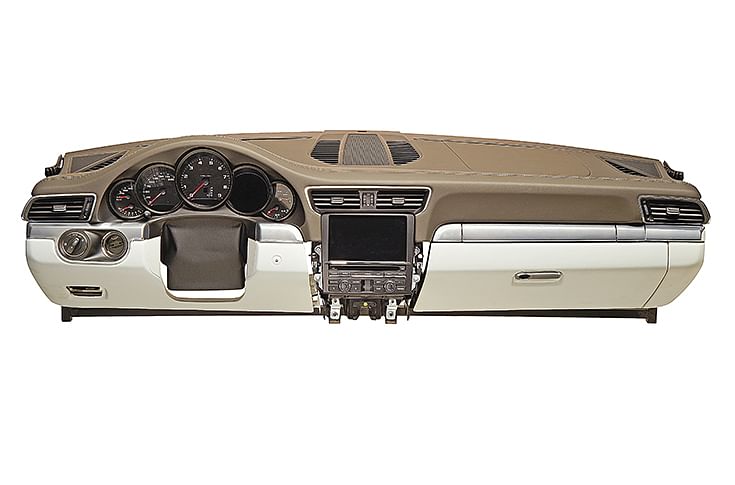 The ability to service the customer and give them options across the board, whatever segment they are eyeing, and then to be able to give differentiation as we have more and more variables in cars, is part of our vision of offering solutions to our customers.
The ability to service the customer and give them options across the board, whatever segment they are eyeing, and then to be able to give differentiation as we have more and more variables in cars, is part of our vision of offering solutions to our customers.
With much research and innovative thinking within the interior space, we have come up with two-tone cockpits where we are able to offer differentiation options within car variants. Also, since we are deploying a unique single slush moulding process, we do it cost-effectively as well.
How do you see the disruptive CASE (connected, autonomous, shared and electric) technologies impacting your business in the future?
Autonomous cars are a long way away, anywhere in the world. Autonomous cars have a lot of challenges, where not just the technology needs to be fool-proof but even pedestrians need to be warned about cautious and obedient road usage.
Moreover, cars and the driving experience brings out that child-like enthusiasm in all of us and even my four-year-old grandsons, when they sit with me in the car, tell me which car is going by. So, with cars driving such intense feelings, we can easily understand why autonomous technology would not work.

Metal product portfolio. Captive tooling is an in-house strength for SMG with seven toolrooms around the world.
The most expensive IP inside the car is made by Motherson – the cockpit, the door pads and all. So, tomorrow, even if these cars come into production in a big way, the most expensive property where one would be able to put all their gadgets is something which we are doing. We are very excited about that, which is where a lot of our effort is going in to catch the imagination of the vehicle occupants. Earlier this year, we showcased our ‘Emphatic Cockpit’ at the CES 2018, which emerged out of the Group’s global cooperation and expertise, where we are innovating with motion sensors and rearview cameras.
We are agnostic to the engine technology disruptions, but we will not allow the change to bypass us and we will keep on reacting to them. One has to find one’s own base and we look at the next five years in terms of the trends and the orders that we are getting. We do not have crazy orders for autonomous or electric cars yet. Out of the 1.2 billion new cars being produced, merely 700,000 to 100,000 cars are electric.
So, while I completely buy that the change is very important for the future and the coming generation, I am just worried about this pendulum ride that people are having that it all is going to be changed within the next 10 years.
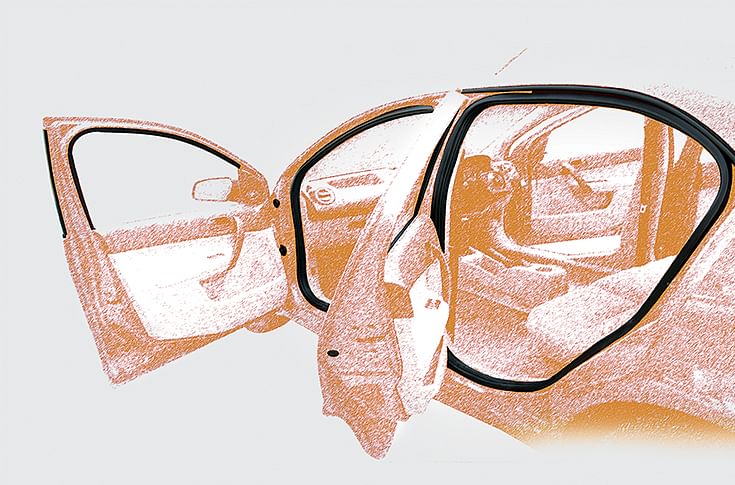
Rubber part applications like weather strips and glass- run channels are a key elastomer produce of the Group.
If everything has to be transformed by 2030, then things should have changed yesterday. I just see that the speed of change is not so fast in case of the automotive world, where in a car live people need to be sitting inside. We have got at least another 20 years before seeing such technologies becoming widespread.
What does Reydel bring to the table for you and do you plan to continue acquisitions in the remaining part of FY2019 as well?
Being a French player, Reydel brings a French touch to the design elements and also more experience in the B+, C and the C+ segments, while SMP, on the other hand, has more competence in the luxury segment, with MATE capable of stretching right from the mass-market to the niche models.
We now have German, French as well as Japanese nuances with us and also have a huge repertoire of different designs, thinking and methodologies. So, we are in a very interesting position and at some point in time, all these technologies will come through together, probably in the form of Motherson Innovations which is going to be a game-changer.
We want to strengthen our presence in America very soon. The target for March 2020 is US$ 18 billion for the listed company – MSSL – which still leaves a gap of US$ 7-8 billion over the next two years. So, acquisitions are going to be the key drivers of this growth. Having said that, while around 5-6 billion of this shortfall will be compensated through acquisitions, probably US$ 1-2 billion will come through organic growth.
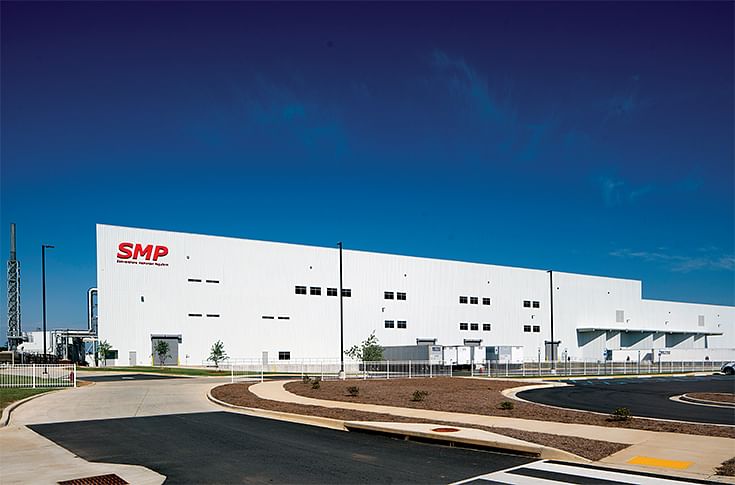
Tuscaloosa USA plant went on stream in April. It supplies door pads, bumpers and roof spoilers to Mercedes-Benz next door.
By increasing ‘content per car’, acquisitions are a great way of doing business as one gets a readymade, running the plant and then you get onto building and expanding business. As we get inundated with requests, we now have our own merger and acquisitions (M&A) mobile application to approve these enquiries. One of the best things that we have done was to have invested in IT ourselves, where the team strength today stands at around 1,600 people with plans to expand the team size to 3,000 people over the next two years.
Apart from the US, which other regions are you eyeing for future acquisitions?
Most of the things that are now going to happen are going to be in the US and we have plans to proceed with many other acquisitions as well. We follow our customers’ requests and will enter whichever market our customers want us to be in. We are open to acquisitions and our customers tell us where we have to go.
We see a lot of pain in the US, Europe and Asia. Our best strategy has been not to have a strategy and that has worked for us over the last 25 years of highly tumultuous times. You have to be nimble footed, reactive and got to focus on the challenges that every country around the world is throwing at you. We have to be looking for ways and means by which we are going to escape that, be like water and take the path of least resistance. One of the biggest assets (SMR) that we bought was during the Lehman crisis, when there was total chaos all around. One just needs to know how to respond to challenges.
We’ve seen that all the chaotic things that have happened, have eventually settled down. Right when we got listed in 1993 until date, what hasn't gone wrong in the world? Plenty of wars, financial crises and more. Everything possible has gone wrong but then life has also progressed.
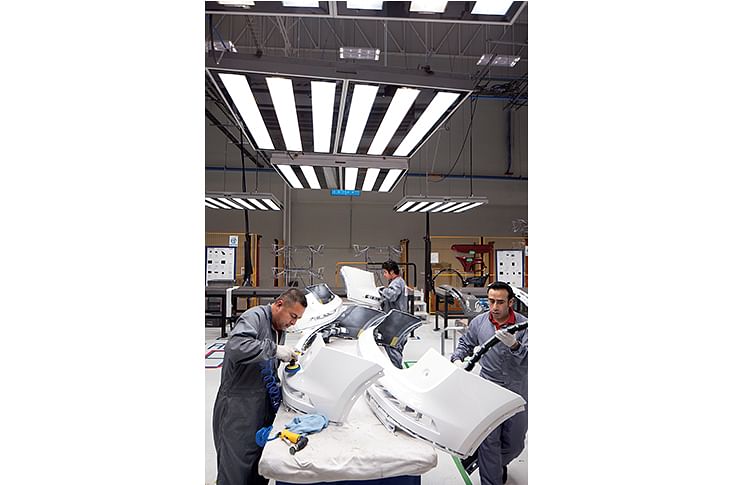
SMP Plant, Mexico. The strong focus on ensuring consistent quality and delivery remains constant across operations.
So, if that is your starting point, it tells me that strategically what Motherson did was right – just to keep on responding to the challenges and not have a concrete strategy.
How do you see the penetration of electrification in India?
I think if it is good, it will happen and if it is not good, it will not happen. The challenges in India are even more pronounced with the government having a huge task of ensuring basic life necessities of food, clothing and shelter. The government should be focusing on that front.
In any case, the penetration of cars in India is too low. It is not like the developed countries where there are 600-700 cars per thousand people, so bringing cars to the masses needs to be the first step.
Moreover, if we are going to go from Euro 4/BS IV to Euro 6/BS VI, that itself is a very significant drop in emissions and the government is right in that direction. Even if car prices go up with Euro 6, the ease in financial support from banks today and with comfortable EMIs, the increased price of the car won't matter much to customers.
You are already supplying EV wire harnesses to Scania. Is electrification going to be a complementary add-on to your wiring harness business?
Yes, with PKC, we are supplying to Scania. Electrification is challenging but we have the technology available with us. Sumitomo is also very advanced in this space and we have the complete access to the technology; so, we are completely ready on that front.
Do you see Tier 2 and Tier 3 suppliers facing a huge challenge in moving towards BS VI, CAFE and safety regulations?
Jointly the Tier 1s, Tier 0.5s and the carmakers will have to ensure that the Tier 2s and Tier 3s come to that level so that the directives of what is required are met. If that doesn't happen, then the Tier 1s will set up capacities of their own. There are a number of carmakers which are facing this challenge and I am sure that Tier 1s will handhold the Tier 2s and Tier 3s.
I think the whole thing is pretty much mapped out and we at Motherson are doing that. We are very clear that we can't go and offer an excuse to our customers that our Tier 2s are not ready. First we will hand-hold them and if things still don't work out, we will go and create our own facilities for such components.
What are your Top 5 growth mantras?
The most important mantra at Motherson is have no excuses. One should just set a target and then go for it. We are probably the only company in this space which sets a five-year target – that has helped us grow tremendously. It doesn't matter if one is not able to achieve it, but at least you try. Most people don't even know where they are going and they're just living by the day. The industry doesn’t live by the day and we have to have some direction and a set goal. Visions and targets are important and when you set those, life becomes much easier. Motherson realised this way back in the early years of our business and we have survived the most tumultuous times in the history of mankind, and have still achieved four of our five-year plans.
We don't benchmark either and we don't compare any of our different units to one another. We follow a BYBY approach – 'Be Yourself, Beat Yourself' – as said by Lord Krishna.
Finally, Mr Sehgal, with your busy schedule, do you get time to unwind and, if yes, then how do you do that?
I travel for almost 300 days in a year and my permanent address is A1 Lufthansa! Yes, I do like to unwind and I do that by playing golf. I am a big movie buff too.
(This interview was first published in the 1 September 2018 issue of Autocar Professional)
RELATED ARTICLES
INTERVIEW: "EV Demand is Rebounding both in India and Around the Globe" - JLR's Rajan Amba
Jaguar Land Rover India MD Rajan Amba discusses the India–UK FTA, the company’s manufacturing plans, the upcoming Panapa...
TVS Celebrates 20 Years of Apache, Eyes Premium and Global Push
Marking two decades of its flagship performance brand, TVS Motor unveiled special anniversary editions on Saturday while...
Q&A: Mahindra's Nalinikanth Gollagunta on Upcoming Festive Season, 'Bold' Design Choices
Automotive Division CEO Nalinikanth Gollagunta says mid-teens growth is achievable with Roxx ramp-up, BEVs, and a resil...






 28 Sep 2018
28 Sep 2018
 18551 Views
18551 Views




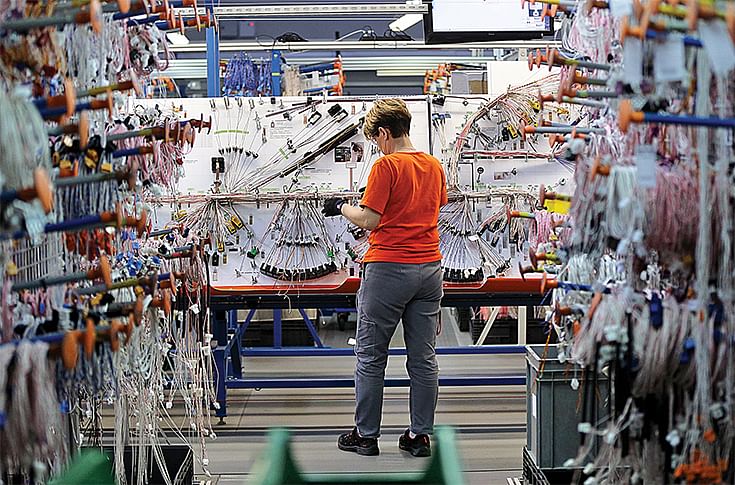

 Prerna Lidhoo
Prerna Lidhoo


 Darshan Nakhwa
Darshan Nakhwa


